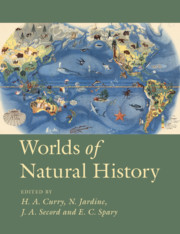Book contents
- Worlds of Natural History
- Advance praise for Worlds of Natural History
- Frontispiece
- Worlds of Natural History
- Copyright page
- Contents
- Plates
- Figures
- Notes on contributors
- Acknowledgements
- Introduction
- I Early modern ventures
- II Enlightened orders
- III Publics and empires
- IV Connecting and conserving
- 24 Global geology and the tectonics of empire
- 25 Zoological gardens
- 26 Provincialising global botany
- 27 Descriptive and prescriptive taxonomies
- 28 Imperilled crops and endangered flowers
- 29 Networks of natural history in Latin America
- 30 The unnatural history of human biology
- 31 Fieldwork out of place
- 32 Wild visions
- Epilogue
- Notes
- Index
- Plate Section (PDF Only)
- References
29 - Networks of natural history in Latin America
from IV - Connecting and conserving
Published online by Cambridge University Press: 13 December 2018
- Worlds of Natural History
- Advance praise for Worlds of Natural History
- Frontispiece
- Worlds of Natural History
- Copyright page
- Contents
- Plates
- Figures
- Notes on contributors
- Acknowledgements
- Introduction
- I Early modern ventures
- II Enlightened orders
- III Publics and empires
- IV Connecting and conserving
- 24 Global geology and the tectonics of empire
- 25 Zoological gardens
- 26 Provincialising global botany
- 27 Descriptive and prescriptive taxonomies
- 28 Imperilled crops and endangered flowers
- 29 Networks of natural history in Latin America
- 30 The unnatural history of human biology
- 31 Fieldwork out of place
- 32 Wild visions
- Epilogue
- Notes
- Index
- Plate Section (PDF Only)
- References
- Type
- Chapter
- Information
- Worlds of Natural History , pp. 476 - 490Publisher: Cambridge University PressPrint publication year: 2018



